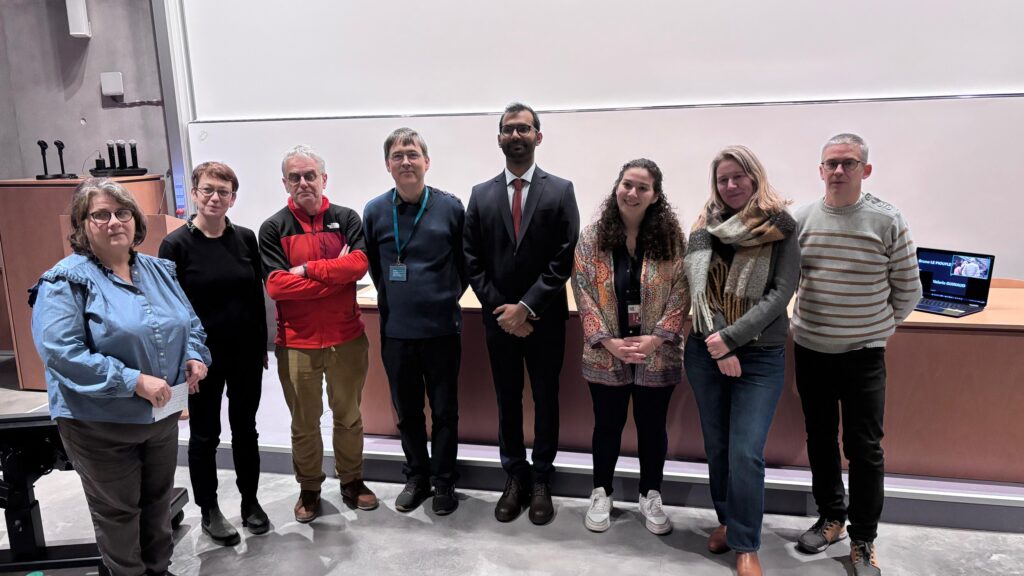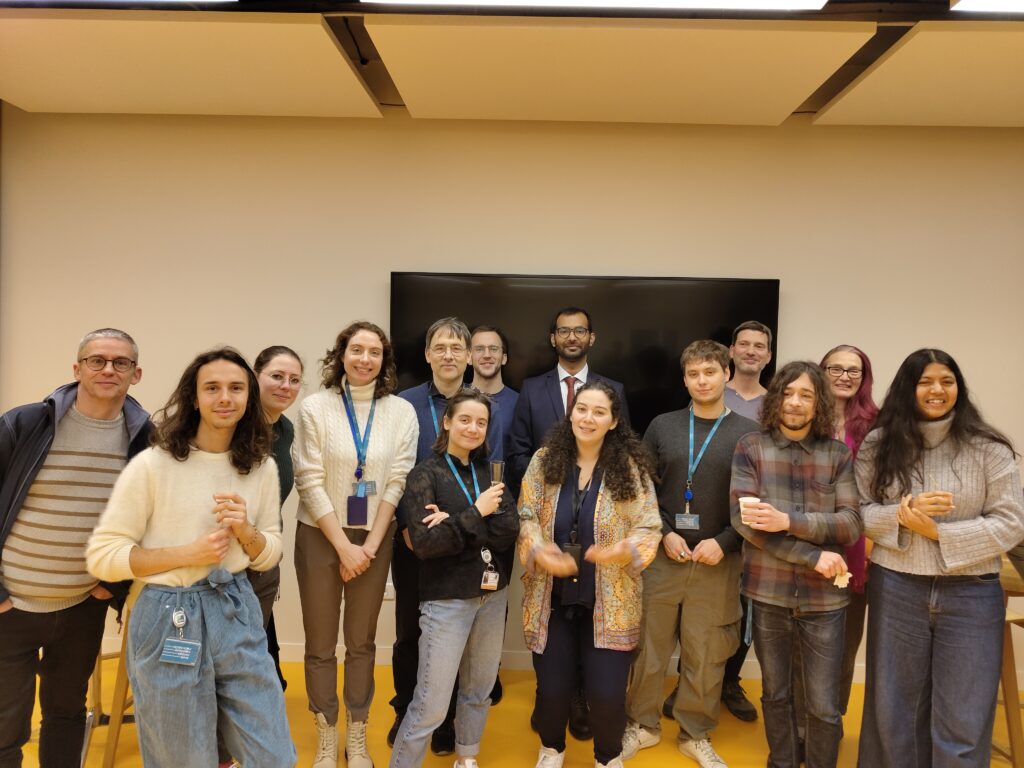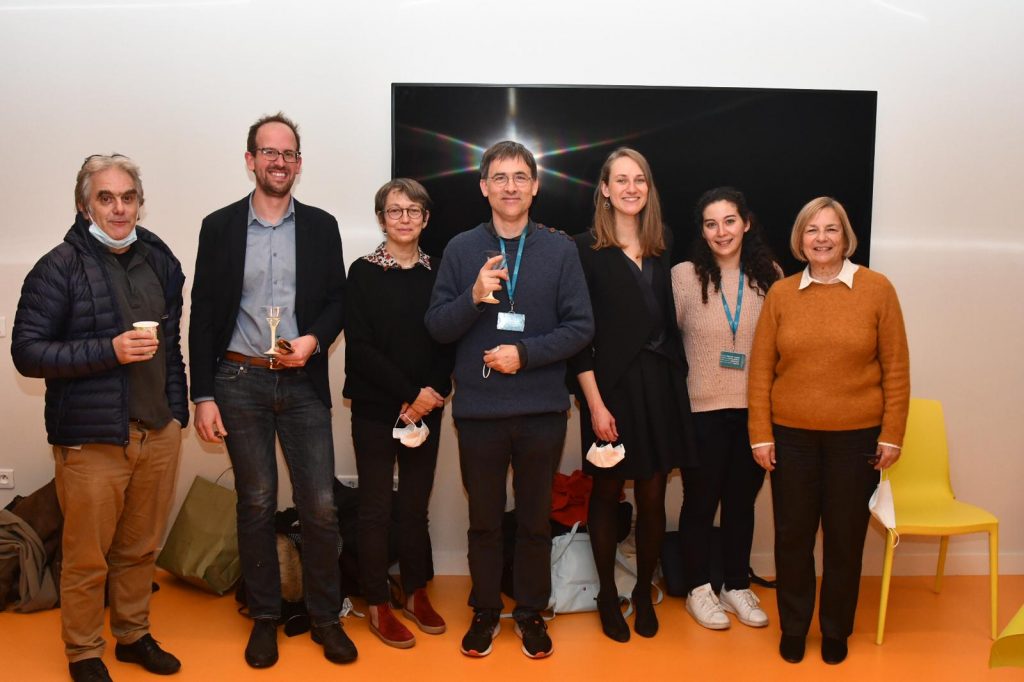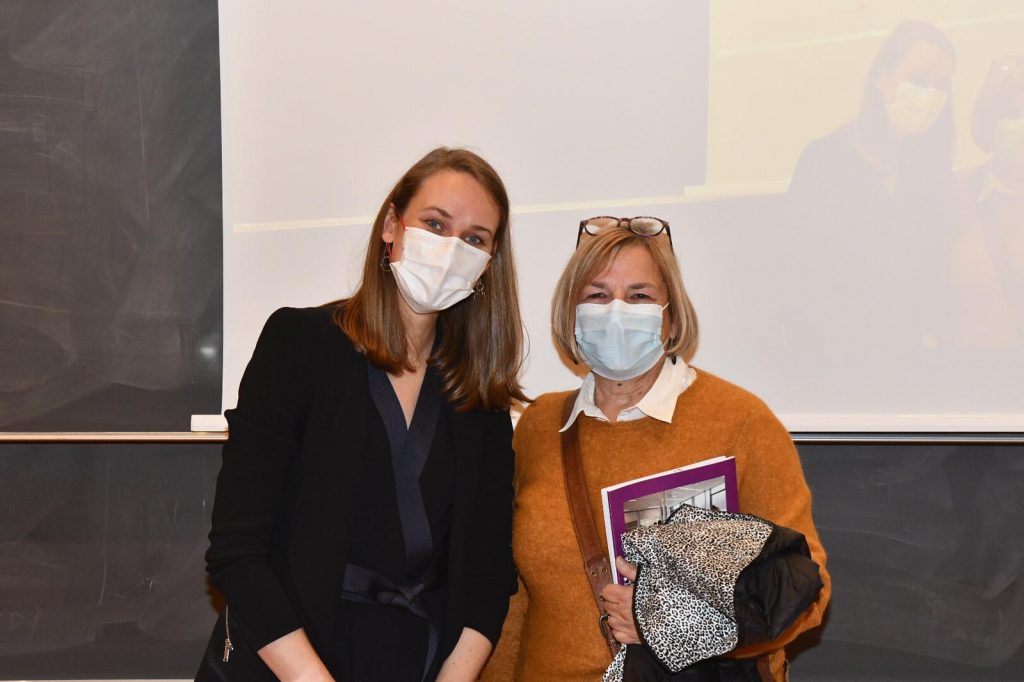Alan Rajendran a soutenu sa thèse de l’Université Paris-Saclay le 18 décembre 2024
“Microfluidic devices for vascularized liver organoids :
Towards the ‘liver on chip“


Alan Rajendran a soutenu sa thèse de l’Université Paris-Saclay le 18 décembre 2024
“Microfluidic devices for vascularized liver organoids :
Towards the ‘liver on chip“


Keywords: mechanofluorochromic sensing, surface functionalization, microfluidics, microalgae, bioenergy
Duration: 24 months
Host institution: ENS Paris-Saclay, Institut d’Alembert, within a laboratory in physics LuMIn.
Location: 4 Avenue des Sciences, Gif-sur-Yvette, 91190
Date of start: from September 2024
In the context of a pluridisciplinary research project at ENS Paris-Saclay (laboratory Lumin, Institut d’Alembert), this postdoctoral study proposes to evaluate microalgae culturing with a focus on growth and
lipid productivity at different scales, from the single-cell scale to the population scale within a bioreactor. A microfluidic device will be designed and fabricated to evaluate at a high throughput the microalgae cells growth and lipid accumulation.
The project will be conducted in collaboration with the team members of the BIOMIS group (LUMIN laboratory, ENS Paris-Saclay). The group is specialized in microfluidics and microalgae processing. The work conducted by the postdoc will be linked to modelling and microscopic techniques developed by two PhD
students of the team. The project will be conducted in the research platforms of the Institute d’Alembert at ENS Paris-Saclay. Cleanroom and microfluidics facilities will be available for the microdevice fabrication and culturing and microscopic platforms for the study of microalgae cultures.
Tasks: The tasks of this post-doc researcher will include the design and fabrication of the microfluidic device, integrating micro-chambers for the culturing of microalgae cells. The optimization of the microfluidic system will be conducted depending on the outcome of preliminary results. Once the microfluidic devices are obtained and evaluated for microalgae culturing under various conditions, experiments will be performed at higher scales (flasks and photobioreactor). For the characterization of microalgae growth, various techniques will be used such as fluorescence microscopy and spectrophotometry. Biomass dry weight and lipid content will also be evaluated.
Competences:
microalgae culturing and cell characterization techniques, photobioreactor culturing. A background in microfluidics, in fluorescence microscopy and/or in modelling will be appreciated.
Contact:
Sakina Bensalem: sakina.bensalem@ens-paris-saclay.fr
Congratulation to Sakina, who succeeded to get a young investigator ANR (ANR JCJC) about microalgae:
MicroPiloting: “A microfluidic system for predictive interaction
models of bacteria and microalgae cells”
Congratulations to Izadora Fujinami-Tanimoto who defended her PhD on september 13th, 2023!
“Biomarkers detection using a nanopore integrated with a microfluidic device“

Our group is involved in an ANR project about the on-a-chip study of cholangiocyte tube: the PERCHOL project This is connected to our liver-on-chip research. The project will started on January 2023.
Durée de 4 à 6 mois
Période souhaitée : premier semestre 2022
Rémunération : gratifications
Les vésicules extracellulaires (EVs) sont des particules lipidiques nanométriques produites par les cellules et impliquées dans l’échange d’informations et surtout celles relatives à l’état physiopathologique de la cellule. Les récentes études les désignent comme d’excellents biomarqueurs pour de nombreuses maladies (Cancer, maladies inflammatoires ou neurodegeneratives)Cependant, un obstacle majeur reste l’isolement et la caractérisation de vésicules rares et porteuses de biomarqueurs pathologiques à partir d’un échantillon biologique prélevé chez le patient.
Ce projet a donc pour but d’explorer de nouvelles possibilités pour purifier, capturer, concentrer, visualiser et caractériser ces vésicules, basées sur l’utilisation des outils microfluidiques. Des microsystèmes permettant de trier et capturer des vésicules par champ électrique seront conçus pour répondre à cet objectif. En cas de succès une mesure des propriétés électriques des vésicules capturées sera effectuée, afin d’établir une signature électrique dépendante de leur contenu.
Le/la stagiaire devra participer aux étapes de caractérisation des vésicules extracellulaires par des techniques complémentaires en place au sein de l’institut Galien Paris-Saclay (IGPS), puis devra concevoir son propre dispositif microfluidique dans la salle blanche de l’ENS Paris Saclay et le tester sur divers échantillons fournis par un collaborateur industriel. Il devra ensuite procéder aux expériences de tri et capture sous microscope.
Ce projet interdisciplinaire (Bioanalyse/chimie analytique/physique) financé par le CNRS, résulte de la collaboration entre deux équipes de l’Université Paris-Saclay situées respectivement à l’Institut Galien Paris-Saclay et à l’Institut d’Alembert de l’ENS Paris-Saclay. La majorité des travaux sera réalisée au sein de l’institut d’Alembert (équipe biomicrosystèmes), les caractérisations d’échantillons en amont des développements microfluidiques seront réalisées à l’IGPS.
Profil attendu : Etudiant(e) en master 1 ou master 2, ayant un profil de physicien appliqué, ou de physico-chimiste. Des connaissances en microfabrication et en microfluidique seront appréciées.
Pour candidater, cliquez sur le lien ci-dessous (la date limite pour la candidature étant le 28 février 2022). Un CV, une lettre de motivation pour ce sujet, ainsi qu’une lettre de recommandation d’un précédent maitre de stage ou à défaut le nom de référents vous seront demandés.
The establishment of techniques for the analysis and detection of rare cells circulating in the vascular network (circulating stem cells, circulating tumor cells, etc.) is significantly useful for the early detection of cancer, or the detection of rare diseases. However, such techniques are currently limited by implementation difficulties the fact that these cells are found at very low concentrations in the patient’s blood. The use of microfluidic systems, permitting high throughput and single cell analyses,is therefore highly significant for overcoming these challenges.
In this context, a research project is being conducted at ENS Paris Saclay, in collaboration with the University of Evry and the hospital Lariboisière of Paris for the development of a novel microfluidic device to detect and capture these rare cells, based on their mechanical properties and particularly their deformability and invasive capacity.
Work to be performed:
The student will as a first part of the study use a microfluidic device, composed of a series of restrictions permitting the application of mechanical compressions on single cells (see image below), to compare the deformability of cancer cells that have different invasive capacities. The passage time in the restriction will be assessed in order to characterize their mechanical properties which will then be compared to an analysis using Atomic Force Microscopy. As a second part of this study, the student will observe and analyze the compression of the nucleus ofeach type of cancer cell using fluorescent markers and confocal microscopy to bring new insights to the characterization of their mechanical properties. Finally, depending on the work progress, the student will study another microfluidic system with a different fabrication process permitting the creation of circular microfluidic channels, more realistic in mimicking physiological flow systems.
Manon Boul a soutenu sa thèse le 19 novembre 2021, ENS Paris Saclay


A new ARN project DILI on CHIP (Drug Induced Liver Injury study on a Chip) is starting from Nov 2021